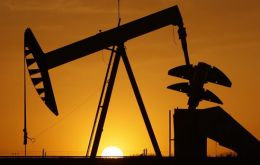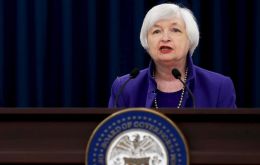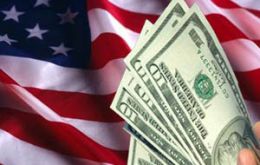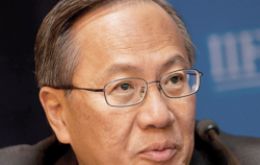MercoPress. South Atlantic News Agency
Tag: Federal Reserve
-
Saturday, January 30th 2016 - 12:31 UTC
US growth slows down sharply to 0.7% annually in the fourth quarter

As anticipated by the Federal Reserve's report earlier this week, US economic growth braked sharply in the fourth quarter as businesses stepped up efforts to reduce an inventory glut and a strong dollar and tepid global demand weighed on exports.
-
Friday, January 29th 2016 - 04:40 UTC
US economy in a bubble, says Trump, ”I hope they pop before I become president'

Republican presidential candidate Donald Trump said the United States economy is in a bubble he fears will burst and he does not want to deal with a financial collapse if he is elected to the White House.
-
Thursday, January 28th 2016 - 06:41 UTC
Fed leaves rate unchanged and is “closely monitoring global economic and financial developments”

The United States Federal Reserve said it was “closely monitoring” global economic conditions, but would not raise interest rates in a decision widely expected by most analysts. The central bank said US economic growth had slowed as exports fell because of the strengthening dollar.
-
Thursday, January 7th 2016 - 08:42 UTC
Fed minutes show concern with global economy and US low inflation persists

The United States Federal Reserve's decision to raise interest rates in December was a “close call”, according to minutes from the Fed's December meeting. Fed members voted unanimously to raise its key interest rate by 25 basis points to between 0.25% and 0.5%. a move widely expected.But some members were cautious, because of global concerns and low inflation.
-
Thursday, December 17th 2015 - 03:40 UTC
Fed hikes rate to 0.25% in unanimous decision; positive reaction from markets

The United States Federal Reserve on Wednesday delivered its first interest rate hike since 2006, with the decision a unanimous one. The central bank raised its key federal funds rate to 0.25%, up from at or near zero percent for the last seven years.
-
Saturday, December 5th 2015 - 06:42 UTC
Positive US jobs data paves the way for the Fed to raise interest rates

US jobs growth remained solid in November as the economy added 211,000 jobs, slightly above expectations. The data, from the Bureau of Labor Statistics, also showed the jobless rate held at its seven-and-a-half year low of 5%. Construction, food services and retail sectors all saw healthy job increases.
-
Saturday, November 7th 2015 - 08:18 UTC
US unemployment drops to 5%; Fed expected to raise rates in December

Expectations of a rise in US interest rates in December have soared following a stronger-than-expected jobs report. The US economy added 271,000 jobs in October, far exceeding the 185,000 jobs that economists had forecast.
-
Friday, October 30th 2015 - 07:39 UTC
US growth slows sharply in the third quarter; consumer spending strong at 3.2%

United States growth slowed sharply in the third quarter of the year. GDP grew at an annualized pace of 1.5% between July and September, according to the Department of Commerce, down from 3.9% in the second quarter. The slowdown was partly due to companies running down stockpiles of goods in their warehouses.
-
Thursday, October 29th 2015 - 07:32 UTC
Fed rates unchanged; fears of monetary easing in EU, Japan and China, and inflation still below 2%

The US Federal Reserve kept interest rates unchanged on Wednesday, but downplayed global economic headwinds and left the door open to tightening monetary policy at its next meeting in December.
-
Wednesday, October 14th 2015 - 11:00 UTC
Global banks warn net outflows from emerging markets close to $800 billion

After a week of discussions at the annual IMF assembly in Peru, bankers and policy makers agreed that stemming the rush of investments from emerging markets was one of the most important challenges facing the global economy. But there was little agreement on how to actually do that.
